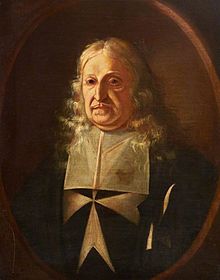Gregorio Carafa
| Gregorio Carafa | |
|---|---|
 |
|
| Grand Master of the Order of Saint John | |
|
In office 2 May 1680 – 21 July 1690 |
|
| Preceded by | Nicolas Cotoner |
| Succeeded by | Adrien de Wignacourt |
| Personal details | |
| Born | 17 March 1615 Castelvetere (modern Caulonia) Calabria, Kingdom of Naples |
| Died | 21 July 1690 (aged 75) Malta |
| Resting place | St. John's Co-Cathedral |
| Nationality | Italian |
| Military service | |
| Allegiance |
|
| Battles/wars | Battle of the Dardanelles |
Fra Gregorio Carafa (17 March 1615 – 21 July 1690) was a nobleman from the House of Carafa and the 62nd Prince and Grand Master of the Order of Saint John from 1680 to his death in 1690.
Carafa was born on 17 March 1615 in Castelvetere (modern Caulonia) in Calabria, Italy to Girolamo, Prince of Roccella and Diana Vittori, the niece of Pope Paul V. His brother was the Cardinal Carlo Carafa della Spina.
He was enlisted with the Order of Saint John when he was aged only three months, in June 1615. He studied in Naples, and various dignitaries and knights of the Order contributed to his education. In 1635 he went to Catalonia with his uncle Francesco Carafa, the Prior general of Roccella. Carafa was soon promoted to Knight Grand Cross of the Order, and was promoted to Prior general of Rocella after his uncle died.
In 1647, he was involved in the Masaniello revolt in which he tried to restore peace and order in Naples. After the defeat of the rebels in Naples, he was sent to Calabria to quell the uprising there. These events led to him being promoted and he was given command of the Order's fleet.
In 1656, he commanded the 7 Maltese galleys at the Battle of the Dardanelles. In this battle, the joint Venetian-Maltese fleet was victorious, and as a reward, Malta received 11 captured Ottoman ships. This battle was heaviest naval defeat for the Ottomans since the Battle of Lepanto.
After the victorious battle he was welcomed in Malta as a hero. Subsequently he reclaimed the wetlands at Bormola and strengthened the Order's fleet.
In 1680, he was elected Grand Master of the Order after the death of Nicolas Cotoner. In the same year that he became Grand Master, Carafa paid for the renovation of Auberge d'Italie. The facade was rebuilt in Baroque style, and a bronze bust of Carafa was placed in a prominent position over the front door of the Auberge. His personal coat of arms was also sculpted close to the bust.
...
Wikipedia
